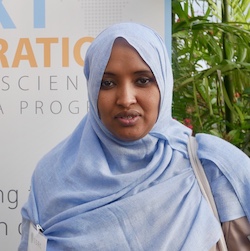Bio
Hafsa Ali Ibrahim is a Kenyan citizen who lives in Nakuru County. She is a wife and a mother of four children: a daughter and three sons. She is also a teacher by profession with more than six years of experience in secondary education and four years in tertiary. Ibrahim is currently a part time lecturer at Egerton University in the Department of Philosophy, History, and Religion. She is pursuing a doctoral degree in philosophy and religious studies in the same university. She holds a Master of Arts in philosophy and religious studies from the University of Nairobi and an undergraduate degree in Education from Kenyatta university.
Ibrahim specialises in counter violent extremism (CVE) programs in Kenya regarding the integration and empowerment of the youth and the women as a strategy to encounter terrorism. She is a volunteer in Integrated Initiative for Community Empowerment, a local NGO that deals with women, youth and security. She is particularly interested in the issues of terrorism and countering violent extremism programs in her county Nakuru by engaging the youth and women in matters of insecurity caused by terrorism. Ibrahim has managed to introduce Nakuru to Strong Cities Network, (SCN), the first ever global network of mayors, governors, municipal-level policymakers and practitioners united in building social cohesion and community resilience to counter violent extremism in all its forms. ‘Nakuru youth bila noma’ is a slogan under which they work with by actively integrating youth and women in peace building processes.

